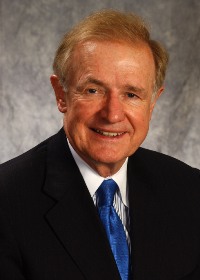Donald Riegle facts for kids
Quick facts for kids
Donald Riegle
|
|
|---|---|
 |
|
| Chair of the Senate Banking Committee | |
| In office January 3, 1989 – January 3, 1995 |
|
| Preceded by | William Proxmire |
| Succeeded by | Al D'Amato |
| United States Senator from Michigan |
|
| In office December 30, 1976 – January 3, 1995 |
|
| Preceded by | Philip Hart |
| Succeeded by | Spencer Abraham |
| Member of the U.S. House of Representatives from Michigan's 7th district |
|
| In office January 3, 1967 – December 30, 1976 |
|
| Preceded by | John C. Mackie |
| Succeeded by | Dale Kildee |
| Personal details | |
| Born |
Donald Wayne Riegle Jr.
February 4, 1938 Flint, Michigan, U.S. |
| Political party | Democratic (1973–present) Republican (before 1973) |
| Spouse |
Lori Hansen
(m. 1978) |
| Children | 5 |
| Parent | Donald W. Riegle Sr. (father) |
| Education | Mott Community College Western Michigan University University of Michigan–Flint (BA) Michigan State University (MBA) Harvard University |
Donald Wayne Riegle Jr. (born February 4, 1938) is an American politician, writer, and businessman from Michigan. He worked in the U.S. Congress for many years. He was a Representative (a member of the House of Representatives) for five terms. He also served as a Senator for three terms.
Contents
Early Life and Education
Donald Wayne Riegle Jr. was born on February 4, 1938, in Flint, Michigan. His father, Donald Wayne Riegle Sr., owned a printing business and later became the mayor of Flint. Donald Jr. went to Flint Central High School.
After high school, he attended Flint Junior College, which is now Mott Community College. He then went to Western Michigan University. In 1960, he earned a bachelor's degree in business and economics from the University of Michigan-Flint. The next year, in 1961, he received a master's degree in finance from Michigan State University.
From 1961 to 1964, Riegle worked for IBM as a financial analyst. He also studied at Harvard Business School from 1964 to 1966. He later taught at several universities, including Michigan State University and Harvard University.
Political Career Highlights
Donald Riegle Jr. had a long and important career in American politics. He served in both the House of Representatives and the Senate.
Serving in the House of Representatives
In 1966, when he was 28 years old, Donald Riegle ran for Congress. He was a Republican at the time. He won the election, becoming the Representative for Michigan's 7th congressional district.
In 1973, Riegle decided to change his political party. He became a Democrat. This was because he disagreed with the government's actions during the Vietnam War. He was re-elected as a Democrat.
One important law Riegle helped create was the Equal Credit Opportunity Act in 1974. This law made it illegal to treat people unfairly when they applied for credit, based on their gender or whether they were married.
Becoming a U.S. Senator
In 1976, Riegle ran for the United States Senate. He won and became a U.S. Senator for Michigan. He was re-elected twice, in 1982 and 1988. His 1988 victory was one of the biggest wins for a Democrat in Michigan's history at that time. He chose not to run for re-election in 1994.
As a Senator, Riegle led several important committees. He was the chairman of the Senate Committee on Banking, Housing, and Urban Affairs from 1989 to 1995. He also served on committees dealing with finance, labor, human resources, and science.
Banking and Financial Reforms
As chairman of the Senate Banking Committee, Riegle worked on major changes to how banks operate. In 1991, he helped pass the Federal Deposit Insurance Corporation Improvement Act (FDICIA). This law made sure that the FDIC could protect people's money in banks. It also made rules to help banks run better and be safer.
Riegle also helped create community development banks. These banks focus on helping communities grow and improve. The "Riegle Community Development and Regulatory Improvement Act of 1994" set up a fund to support these banks.
Another important law he helped create was the "Riegle-Neal Interstate Banking and Branching Efficiency Act of 1994." This law made it easier for banks to operate across different states.
Investigating Gulf War Illnesses
In 1994, Senator Riegle led an investigation into illnesses that many veterans were experiencing after the Gulf War. This investigation looked into whether U.S. soldiers had been exposed to chemical warfare agents. The report, often called the "Riegle Report," suggested that some biological agents might have been given to Saddam Hussein by the U.S. It called for more investigation and help for veterans suffering from what is known as Gulf War syndrome.
Riegle also played a key role in reforming the savings and loan industry. In 1989, he helped pass the Financial Institutions Reform, Recovery, and Enforcement Act (FIRREA). This law put an end to many problems in the industry and made it much stronger.
Life After Politics
After leaving the Senate in 1995, Donald Riegle continued to work in the business world. He joined a public relations company called Weber Shandwick Public Affairs. He helped build their government affairs section. Later, in 2001, he became chairman of government relations at APCO Worldwide, another public relations firm.
Riegle has also written a book. In 1972, he co-authored "O Congress," which shared an inside look at how Congress works.
In recent years, Riegle has supported Bernie Sanders for the Democratic nomination for President of the United States in both 2016 and 2020.
See also
- List of American politicians who switched parties in office
- List of United States representatives who switched parties
 | Janet Taylor Pickett |
 | Synthia Saint James |
 | Howardena Pindell |
 | Faith Ringgold |

